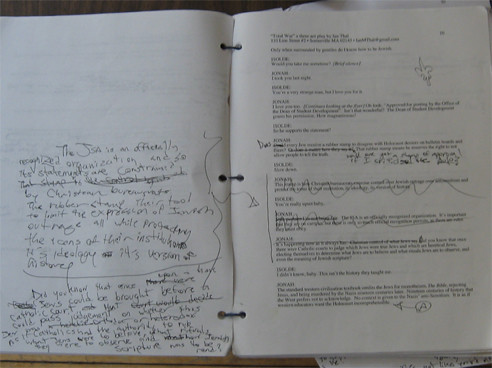
While visiting family for the Thanksgiving holidays I slipped away to the local coffeehouse for a macchiatto and a few hours of revision work on the manuscript of my play.
Back in April, I submitted the play for a series of open readings so to workshop it into a finished draft. The play was not selected this time around, but I did receive some useful feedback from the reviewer, playwright Lisa Burdick, while while a couple of weeks prior, a trusted friend, Bernard Sheehan, (and creator of the webcomic, Brainfries) who had read the same draft also weighed in.
Without going into details, I realized that most of the problems with the script had not been solved by the set of revisions I wrote about previously. One matter that was pointed out to me was that it was not economically possible for most professional companies to stage a show with such a large cast of characters. Once upon a time, in a far away land, when theatre had far less competition from forms of entertainment and actors could live on nothing but air and applause, such a thing could have been possible. Today, theatre is neither film nor television, where an actor can be hired for a role that requires a single day of shooting or where a supporting character can appear again and again without any indication they might have a pivotal role to play.
While some of the problem can be solved with simply having some of the supporting characters be played by the same actor (as I sometimes do) the feedback I received also indicated that a couple of the characters simply did not work and they introduced subplots that distracted from and confused the resolution of the main story lines. Interestingly enough, both readers had problems with the same characters. While my first impulse was to defend my rationale for creating these characters, I came to realize that if I had to defend the presence of a character to two readers who otherwise found the story interesting then the fault was with the characters that I had written, not with the readers' understanding. In the end, I decided to give four characters the axe, taking with them most of their respective plot points. However, since some of those story elements needed to be saved I had to grafted them onto the remaining characters. In one case, that resulted in what had previously been two supporting characters becoming one who was far more central, in fact, I might even say that as this new draft is taking shape, that it has a whole new protagonist, whose motives are far more apparent than either of her predecessors.
The other consequence of this smaller cast of characters is that different things happen at different times for different reasons so at times it seems as if, rather than reshaping the storyline, I am discovering the storyline as it reshapes itself. It's an exciting and joyful process to make such discovers. The central issues still remain, but the story that is emerging is now very different from the actual events that first inspired me to write this tale.
Thursday, November 22, 2007
Feedback and Redrafting
Posted by
Ian Thal
at
11:52 AM
![]()
![]()
Labels: Bernard Sheehan, Lisa Burdick, theatre, total war, writing
Subscribe to:
Post Comments (Atom)



No comments:
Post a Comment